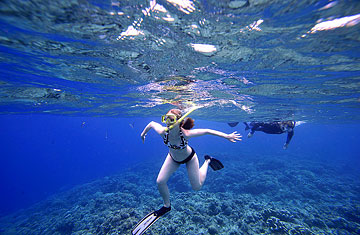
Bunaken Island National Park in Manado, Indonesia, is considered one of the world's top diving destinations, but the pristine marine landscape is threatened by garbage from nearby towns
Thousands of divers come from around the world every year to explore the Bunaken National Marine Park in Indonesia, hoping to snap a picture of an eagle ray, giant clam or maybe even a black-tip shark. The waters around Bunaken Island are so clear that tourists can catch a glimpse of the amazing underwater life without even leaving their glass-bottom boat. But they are also likely to see something that's not in the brochures: trails of plastic bottles, empty cigarette packs and other forms of detritus washing into the sea.
Bunaken lies in the center of the Coral Triangle (comprised of Indonesia, Malaysia and the Philippines) and is one of the richest intersections of marine biodiversity in the world. It was designated a protected nature reserve by Indonesia in 1991 but the hundreds of species that exist in the 80,000-hectare area are still under threat. As Indonesia campaigns to have Komodo Island included as one of the world's seven natural wonders and Bali grapples with a crime spree and rampant overdevelopment, officials might also give consideration to cleaning up what ought to be one of the world's top diving destinations. "I have never seen a sea this dirty," exclaims Fabienne Bothy Chesneau, a diver visiting from Paris. "This place is so beautiful but it needs to be protected."
One only need take a quick drive though Manado, the capital of North Sulawesi, to see piles of garbage along the main roads, with nary a dumpster or trash can in sight. Dive operators in the area cite government studies singling out residents for the majority of the waste produced, much of which ends up in the rivers and then washes out to sea. "The rainy season is the worst," says Roel Jong, who has been living and working in Manado since 1996 at his Lumbalumba Diving Resort. "I have never seen it this bad and many of us are afraid it is only going to get worse if something isn't done soon."
The North Sulawesi Watersports Association, which Jong heads, recently mounted a successful campaign to help rally local support to stop a reclamation project that would have turned many miles of coastlines into beachfront hotels, fast food outlets and other commercial developments. While activists in the area are fearful the project may start up again, they are now focusing efforts on getting the government to act before the once-pristine Sulawesi sea is soiled beyond salvation. "The reefs are our capital," adds Roel. "Once you've lost that, it is all over. There will be no reason for tourists to come."
With fewer than 25,000 international arrivals every year, Manado attracts a tiny fraction of foreigners compared to Bali, the country's most popular and well-known destination. But unlike Bali, where tourism and development is straining clean water supplies and devouring any and all beachfront still available, it is the local population upstream, on the coast and in the city that are responsible for 90% of the garbage, according to local government study finished this year. Consumption is on the rise here, but there is little cultural awareness when it comes to trash. There are not enough bins and the enforcement of anti-littering laws is lax.
In Manado, the run-off is especially bad in the rainy season (which generally lasts six to eight months during the year) when dive guides do double duty pointing out marine life underwater while scooping up fistfuls of empty plastic bags and whatever else washes by. "The trash and lack of patrols are two of the biggest problems here," explains Kaj Maney, who runs a dive resort in nearby Lembeh. In August, Maney and 12 other resorts in the area stopped paying the "tag" fees levied on tourists to protest the absence of any patrol boats looking out for anyone fishing illegally or dumping trash in the Lembeh Straits, home to hundreds of rare species of small fish and bottom-dwelling creatures.
Dive operators are willing to do their part to raise awareness of the trash problems by proposing various community-based solutions, from composting to cleaning up the beaches. They are also in favor of limiting the number of resorts, currently estimated at less than 80, to make sure Manado does not suffer the fate of Bali, where activists are constantly battling threats not only to the environment but to the local way of life. "Bali is an agricultural society and the farmers will revolt if the hotels continue to consume all of the fresh water on the island," predicts Wayan Gendosuarda, who runs the Bali chapter of the environmental watchdog Walhi.
The way of life for millions of Manadonese, many of them fisherman, is also at stake. At a time when Indonesia is trying to project the image of tropical paradise that is safe and welcoming to foreign tourists, local officials need to view their seas as more than a giant toilet. In Manado there are no sandy beaches and no surfing. Everyone comes to dive, some spending up to 35 hours to get there. "The problem can be solved if the government shows the will and some leadership," says Roel. "But we need the people to show they're fed up too."
